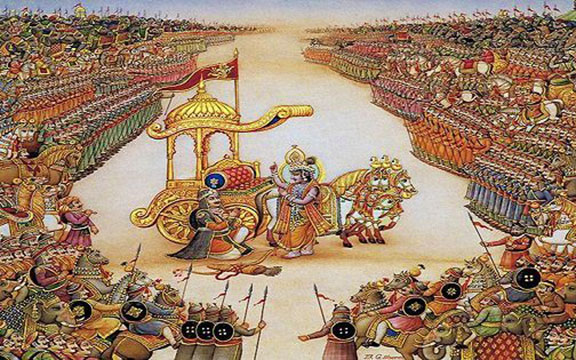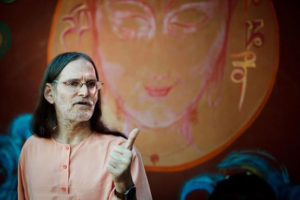
Photo: Arjuna requested Sri Krishna to place the chariot between the two warring sides.
In Part 5 of this series, we went over the first verse of the first chapter. I’d like to skip ahead now to the twentieth verse of the first chapter where Arjuna says to Sri Krishna: “Place my chariot in the middle of the two armies, O Krishna, so that I may behold those who stand here desirous of fighting and know with whom I must fight as the battle is about to commence.”
A big battle is about to take place. It’s a war between the sons of the blind king, and his wife Gandhari, and believe it or not they number 100. They are in battle against the sons of Pandu, the blind king’s brother, and there are five of those brothers called the Pandavas. So, actually, it’s a war between cousins! Sad! But, the esoteric meaning of that is that they’re representing two parts of you and I. These two parts coexist within our same heart: the self-centered part and the altruistic or virtuous part.
The problem is that the self-centered part (represented by the children of Gandhari and the blind king) number 100. But, the Pandavas, the virtuous part, the part that actually cares about others and looks for the unfolding of the soul only numbers five. So it’s a 20:1 ratio. You could say that for every selfless thought we have, we have 20 thoughts of What about me? This means that we tend to be preoccupied with the proverbial “taking care of number one.”
Arjuna is the middle son of Pandu and his wife Kunti. And those who know more about the Mahābhārata know that’s not totally accurate. But to keep things simple for today, let’s say that’s true. The name “Arjuna” means “the one who makes sincere efforts.” So he’s been purified to the point that he has become a genuine seeker and someone who is sincerely trying to understand the purpose of life.
The name “Krishna” comes from the Sanskrit root krish, meaning “to draw.” Sri Krishna represents the Consciousness at the core of our being that is continually drawing us back to the Source. This battle is taking place because the Pandavas have been in exile for 13 years and their exile has just ended. It had been arranged that after the 13-year exile, they would return and reign over a certain part of the kingdom. But, the blind king’s son Duryodhana has reneged on the deal. And there seems to be no option. They did their best but now they have to stand and fight for their right to reign.
You could say that a part of us—you can call it “the soul”—also has been in exile for a long, long time. If you’re reading this, you may sense that after many lifetimes of hard knocks and difficult lessons, the noble part of you is seeking to return to its rightful reign, to being the chief guide of our being and our psyche. And, the Bhagavad Gita is the guidebook on how this conflict—between the part of us that is determined to stay asleep and the part of us that aspires to wake up—is going to be resolved.
My Guru, Swami Satchidananda, says, “This battle didn’t just happen some thousands of years ago. It is constantly happening. It is within each of us.” So the homework assignment for this week, if you would like to join me, is to ask yourself these questions: Do you feel that there is a part of you that’s blind and wants to remain asleep? If so, how does that manifest?
About the Author:
 Swami Asokananda, initiated into monkhood in 1973 by Sri Swami Satchidananda, is the spiritual director of Integral Yoga Institute of New York, co-director of the Integral Yoga Global Network, and one of Integral Yoga’s foremost teachers. He is the primary instructor for the Intermediate and Advanced Hatha Yoga Teacher Trainings offered around the world. He has deeply studied the Bhagavad Gita for many decades and is currently writing a commentary.
Swami Asokananda, initiated into monkhood in 1973 by Sri Swami Satchidananda, is the spiritual director of Integral Yoga Institute of New York, co-director of the Integral Yoga Global Network, and one of Integral Yoga’s foremost teachers. He is the primary instructor for the Intermediate and Advanced Hatha Yoga Teacher Trainings offered around the world. He has deeply studied the Bhagavad Gita for many decades and is currently writing a commentary.

